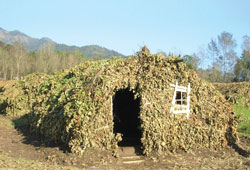|
|
And if they don't happen?
Whether or not elections happen depends on the present government's willpower. It will be a challenge to go to polls as planned. Law and order, the security situation, and technical issues have to be dealt with first. Look at what is happening in madhes, such incidents will delay the process. I recently spoke with the UN's Ian Martin, and he said Nepal is not ready to hold elections in June, and that if the elections were to happen, the results would be questionable.
So are you preparing to push the elections back?
No, no. I was just briefing you on the situation. If the elections don't happen, the unity between the eight parties might not hold. We may decide not to be a part of the government. If there are forces hatching conspiracies against the elections, what's the point in our being part of the government? Even if we drop out, we will support the government from the outside and the peace process will continue-it is stronger than all this. We might push the government to conduct the elections, but we will not go back to war.
There were disagreements in deciding on the council of ministers, though.
There were objections to us being a part of the government right from the start. On 16 June 2006 when I went to Baluwatar to sign the eight-point agreement, it was the NC. When the comprehensive peace treaty was signed in November, the UML wrote a note of dissent. When the interim constitution was agreed upon, the Sadbhawana Party objected and Nepalganj happened. We are pushing to make the interim period as short as possible. Disagreements within the other parties caused the deadlock.
Are there forces that want to break the eight-party alliance?
I don't want to say that. However, the parties have been lacking the urgency on some issues. Take the temporary camps (pictured above, chitwan cantonment) where 31,000 of our friends are living in very difficult conditions. If their concerns continue to be ignored, the eight-party unity may break. But we are very hopeful, and I will talk to the UN and the prime minister soon about temporary camps and the possibility of elections.



